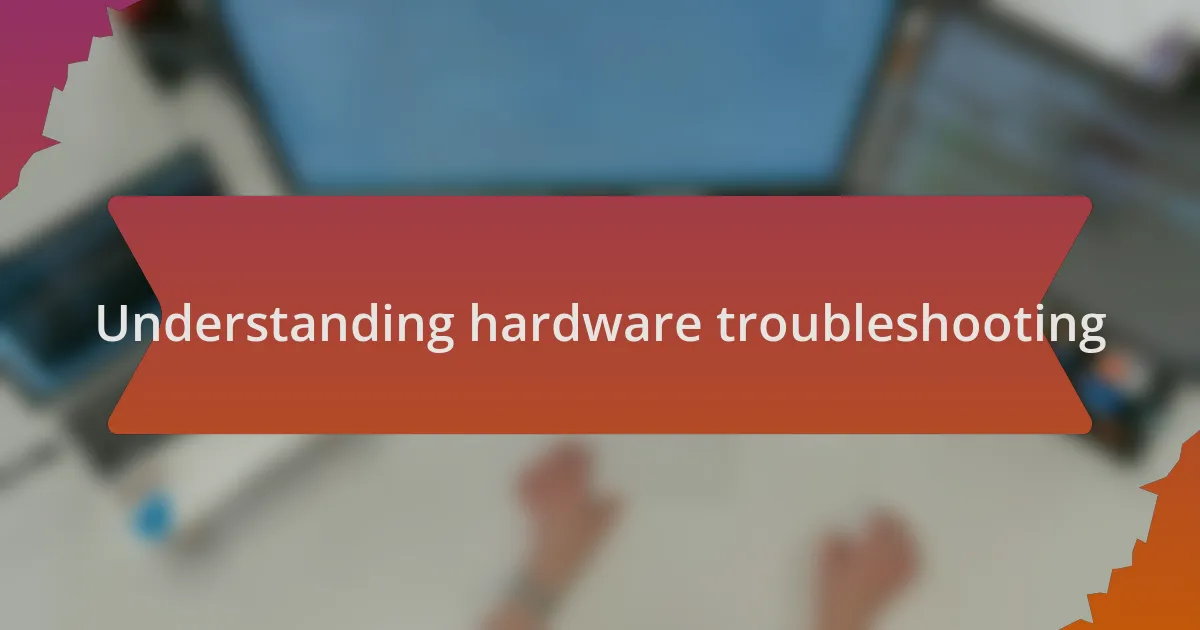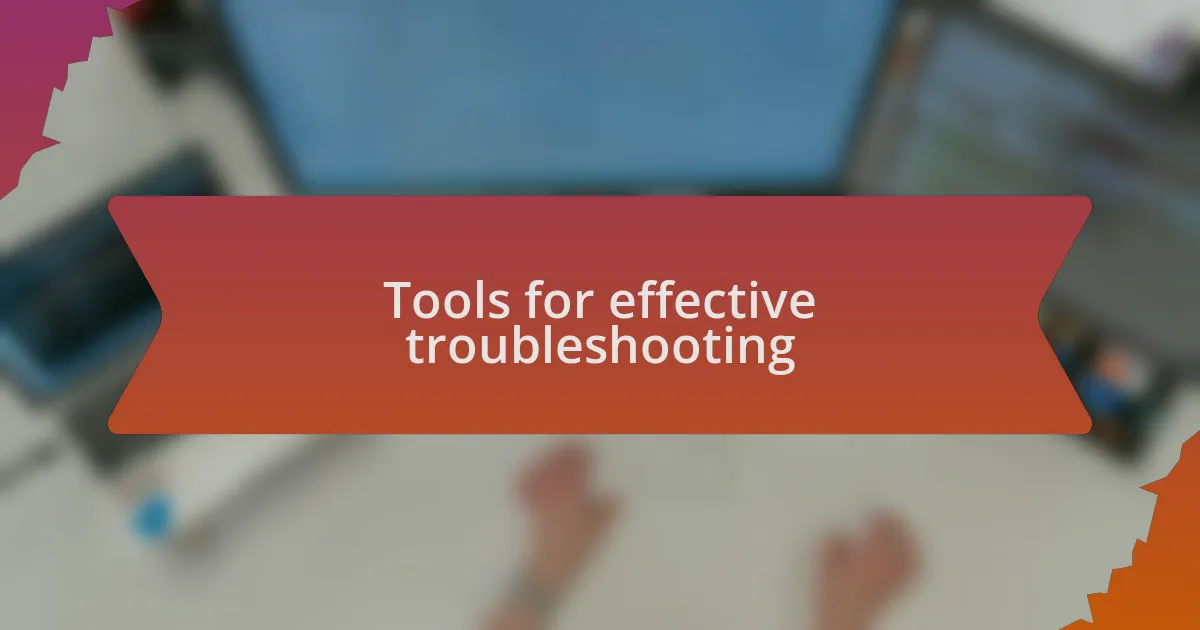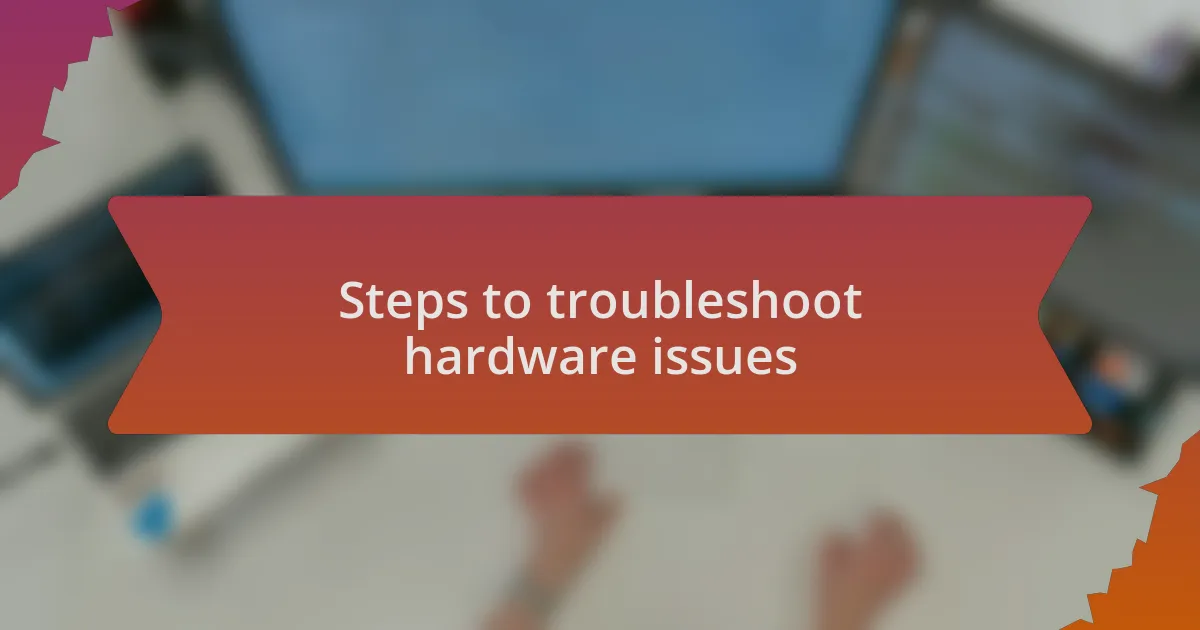Key takeaways:
- Effective hardware troubleshooting relies on patience, methodical thinking, and checking basic connections first.
- Technology reviews provide crucial consumer insights, helping users make informed decisions and fostering community discussions.
- Common hardware issues often stem from simple causes, highlighting the importance of thorough diagnostics and regular backups.
- Documenting troubleshooting steps and learning from failures significantly enhances problem-solving efficiency and personal growth in technology skills.

Understanding hardware troubleshooting
Hardware troubleshooting is a vital skill for anyone who engages with technology. I remember the first time my computer wouldn’t start; it felt like my entire world had come crashing down. I had to pause, breathe, and think—was it the power supply, the RAM, or something else? This kind of reflection is essential because determining the root cause of a problem not only guides solving it but also builds a deeper understanding of how hardware components interact.
It’s fascinating to realize that many hardware issues stem from simple oversights. For instance, I once spent hours troubleshooting a printer that seemed completely unresponsive, only to discover it was disconnected from the network. This experience taught me the importance of checking the basics first. How often do we overlook the obvious? I’ve found that revisiting fundamental connections can often reveal the answers we initially missed.
As I continued my journey in hardware support, I learned the value of patience and methodical thinking. Each problem is like a puzzle waiting to be solved. For example, when my laptop’s screen suddenly went black, instead of panicking, I methodically tested each component—cables, connections, and settings. This approach transformed my frustration into a sense of accomplishment, affirming that understanding hardware troubleshooting goes beyond technical know-how; it’s also about cultivating a problem-solving mindset.

Importance of technology reviews
When I browse technology reviews, I’m often struck by their profound impact on decision-making. It reminds me of the time I almost purchased a smartphone based solely on sleek advertisements. Fortunately, I stumbled upon an in-depth review revealing significant battery issues that would have left me frustrated. It underscores how reviews can highlight pitfalls that manufacturers might not disclose, acting as a necessary lens for consumers.
Reviews also serve as a bridge between technology enthusiasts and everyday users. I’ve often felt overwhelmed by complex specs and jargon; however, a well-written review breaks down the technical language into digestible information. Isn’t it reassuring to read someone else’s experience before diving into a new gadget? This communal knowledge not only empowers me but also fosters a sense of trust among users navigating the ever-evolving tech landscape.
Moreover, technology reviews can spark meaningful conversations and communities. I remember joining a forum after reading an insightful critique of a popular gaming laptop; discussions about its performance ignited a blend of excitement and skepticism. When consumers come together to share their thoughts, it not only enriches our understanding but also creates a space where we can collectively learn and make better-informed choices. Who hasn’t felt a sense of camaraderie among strangers united by a common interest?

Common hardware issues faced
When it comes to common hardware issues, I’ve encountered my fair share. One moment stands out: I was working on my laptop when it froze unexpectedly. After panicking, I discovered it was a simple RAM issue. I learned that a faulty memory module can cause system instability, which made me wonder how many others have faced similar frustrations without knowing the root cause.
Another issue I often see pertains to overheating components. I remember a friend who continuously struggled with their gaming PC shutting down mid-session. After some troubleshooting, we found that the CPU cooler wasn’t properly seated. It struck me then how vital cooling systems are, and it raises an important question: Are we doing enough to ensure our devices have adequate ventilation?
Additionally, storage failures are frequent culprits in hardware malfunctions. I once lost valuable data when my external hard drive failed without warning. This experience reinforced my understanding of the importance of regular backups. How often do we risk our data by neglecting these preventive measures? It’s a wake-up call for anyone relying heavily on technology.

Tools for effective troubleshooting
When troubleshooting hardware issues, I’ve found that having the right tools can make all the difference. A multimeter, for instance, became my best friend while diagnosing a stubborn power supply problem in my desktop. It’s amazing how a tool that measures voltage can save you from unnecessary component replacements. Have you ever wondered how many potential fixes are overlooked simply because the right tools aren’t in hand?
Another essential tool I’ve come to appreciate is software diagnostics. During one troubleshooting session, I used a diagnostic utility that not only pinpointed a corrupted hard drive but also provided a roadmap for recovery. The level of detail offered by these programs is impressive, and it made me realize that sometimes our physical tools need a little digital backup. How often do we rely solely on our intuition rather than the wealth of information at our fingertips?
Lastly, cable testers have proven invaluable in my journey through hardware troubleshooting. I remember a time when my network connection was dropping intermittently. A quick check with a cable tester revealed a frayed Ethernet cable that I had initially overlooked. It struck me that even the smallest components can cause significant disruptions, and making sure every cable is in top shape is just as important as checking the big hardware. Do we sometimes forget that the path to resolving issues starts with the basics?

Steps to troubleshoot hardware issues
When faced with a hardware issue, I often start with a visual inspection. In one instance, I noticed a loose connection on my motherboard that led to frequent crashes. It was a simple fix, but it highlighted how valuable a careful look can be; sometimes, our eyes can spot what tools might miss.
Next, I believe in the power of process of elimination. I remember a frustrating day when my printer refused to cooperate. By testing it with different devices and swapping out cables one at a time, I finally pinpointed a faulty cable as the culprit. Have you ever felt that rush of relief when the problem suddenly becomes clear?
Finally, documenting each step of the troubleshooting process is something I can’t stress enough. During a particularly challenging issue with my gaming rig, taking notes helped me track what I had already tried and avoid repeating steps. This not only saved time but also reduced my frustration. Have you found that keeping a log can lead to those ‘aha’ moments when you least expect them?

Lessons learned from practical experience
The most profound lesson I’ve learned from hands-on troubleshooting is the importance of patience. I once spent an entire evening wrestling with a non-responsive hard drive. After what felt like an eternity of frustration, I stepped away to clear my mind. When I returned, I approached the issue with fresh eyes and discovered that a simple reboot was all it needed. It reminded me that sometimes, the best solutions surface when we give ourselves a moment to breathe.
Another valuable insight I’ve gained is the significance of asking for help. Early in my journey, I hesitated to reach out to friends or online forums, thinking I had to solve every problem alone. I recall a time when I was baffled by a network issue that stumped me for hours. Finally, I reached out to a technician friend who identified the problem within minutes. This experience taught me that collaboration often leads to quicker resolutions and can make the troubleshooting process a lot less lonely.
Lastly, I’ve come to appreciate the power of learning from failure. There was an occasion when a repair attempt on my graphics card not only failed but also resulted in further complications. Although it was disheartening at first, I realized that each error provided valuable insights into the intricacies of hardware. Have you ever experienced a setback that ultimately paved the way to a valuable lesson? Embracing these missteps has become a crucial part of my growth in the tech world.

Personal takeaways from troubleshooting
One takeaway that stands out to me is the realization that every issue can be a learning opportunity. I remember a time when my laptop screen went black right before an important deadline. Panic set in, and my heart raced as I feared losing everything. After some frantic research, I discovered it was a simple cable connection issue. That experience showed me the value of thorough investigation; sometimes, it’s the simplest problems that catch us off guard. Have you ever ignored the basics and found yourself in a tight spot?
Another important lesson I’ve absorbed is the benefit of keeping a troubleshooting log. I used to dive into problems without documenting my steps, thinking I’d remember them all. But, after struggling to replicate and understand previous fixes, I started jotting down each experience. Now, when a similar issue arises, I can refer back to my notes. It’s almost like having a personal guidebook—I wish I had done it sooner. Have you ever wished you could retrace your steps in a complex situation?
Lastly, I’ve learned that troubleshooting can be an emotional rollercoaster. There were times when I felt like I was battling a beast, especially when solutions seemed out of reach. A particularly stubborn motherboard issue had me questioning my abilities. But overcoming that frustration taught me resilience and perseverance. Each time I pushed through, I emerged not just as a better troubleshooter but as someone more adaptable to challenges. Isn’t it fascinating how technology can teach us more about ourselves than we realize?